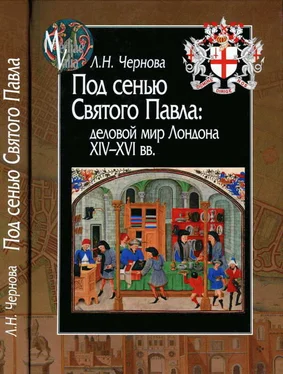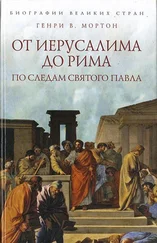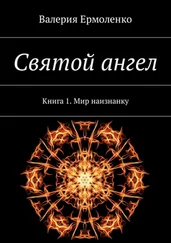Business connections between ruling families in the spheres of trade, finance and credit operations, investment into real estate and its commercial usage can be clearly traced in the alderman environment. Family solidarity seems to be the most important instrument of political and economic dominance of the elite.
However, seclusion of the aldermen community of the 14 th— 16 thcenturies was not absolute. It was constantly replenished by people from different social layers and communities. Among them there were London merchants and merchants from various towns and boroughs of England who possessed large financial resources and good reputation in business and, as a rule, younger sons of the gentry from various counties of England to provide for life being involved into trading which was, at least in the 14 thcentury, a well-known activity.
A wide and regular inflow of new forces from counties and provincial English towns had a positive impact on qualitative characteristics of London alderman community. There was a considerable and more or less regular renewal of its members who strived for success and making a career and who, first of all, relied on themselves, their abilities and opportunities. All this strengthened economic might of big London merchants and interconnections between the classes, strengthening, therefore, the position of aldermen in the city community and authorities.
Marriage to those who belonged to different social groups and layers was one of the most important instruments of realization of a typical for London men of business tendency to the dialogue with a surrounding world. Matrimonial interests of business community covered representatives of the merchant class, both of the capital and provincial towns. It is obvious that such marriages promoted not only strengthening business cooperation among English merchants, but also were one of the few means of penetration of rich and enterprising merchants into the business world and London ruling class. Many businessmen families of London related to English aristocracy of different levels, both gentry and knights and even titled aristocracy. This shows a considerable interest of commercially active city dwellers in socially more prestigious community of the 14 th— 16 thcenturies and their wish to penetrate into it with the help of marriages which corresponded to their social ambitions and desires. Some noblemen would not mind to relate to the richest merchants. Such matrimonial behavior of noblemen was caused by the closeness of economic, social and political positions of the big merchant class and gentry and the desire of some aristocrats to improve their financial position.
Commercial activity of London men of business was complicated and reflected a contradictory social and economic nature of the 14 th— 16 thtown itself.
First of all, merchants carried on a large-scale trade in London, inside and outside England. It was trade, seen as worthy, honorable and pious work, that took the most important part of their minds and required from them manifestation of rationalism, common sense, business activity, professionalism and understanding that their aim was to get additional benefits. Wealth which became the measure of achieved success and social importance caused a complicated conflict with some elements of Christian consciousness. How to use this wealth and not to be cast into hell-fire, but to provide for the family and close people was the problem which aldermen tried to solve in their wills. Understanding of the risk that accompanied their profession and the desire to provide their safety incited aldermen to search for God's and saints' protection which is reflected in a widely spread practice of sacrifices recorded in their wills. In fact, it can be said that the merchant class worked out a new type of religiousness which combined the belief in God and fear of after death punishment with a commercial approach to the so called “good works” that brought success in the land of the living and a reward after death. Great opportunities for trade and having income were given by livery, merchant by nature, companies whose members were merchants-aldermen. Besides them in the 14 th-16 thcenturies there were also family associations, companies of merchants-? of Calais and merchants-adventurers, and a number of new corporations that emerged and functioned on share principles in the 16 th— the beginning of the 17 thcenturies (Moscow, Levant, East Indies and so on). It is important to note that they all united and attracted to cooperation not only London aldermen from various livery companies but other merchants from the capital and provinces and representatives of English noblemen and church as well. A considerable number of people from different social groups were involved into the sphere of trade and interacted successfully which led to the expansion of trade and increasing of its volume. As aldermen were among the biggest shareholders, they were those who received the main profit from it.
It was especially seen in the 16 thcentury when a considerable expansion of the scale and trade spheres of London aldermen took place. There are solid grounds for speaking about the connection of some London business community representatives of that time with the process of formation of new, organized on early capitalist principles production. Men of business from the capital not only started to export the English industry products but also supplied the whole branches with imported raw material: cloth making, cotton manufacture, shipbuilding, mining industry and metal manufacture. Besides, some aldermen of the second half of the 16 thcentury took part in organizing pirated businesses and colonial expeditions investing into them big money but at the same time making a huge profit.
Another important sphere of London merchants' economic activities was lending operations that connected them with representatives of different social groups. London men of business lent money to merchants from livery companies, craftsmen from the capital and provincial merchants, clergymen, noblemen and the crown. Such broad social communications not only reflect the degree of this social community financial might, which is, of course, very important, but they also show the level of development of economic ties among towns and regions of England and the nature and scale of social interaction among various classes and inside class groups.
Recognizing priority significance of commercial and financial activity for men of business in London of the 14 th— 16 thcenturies, it is necessary to note that many of them were also owners of land and real estate in the town and various counties of England. During this time capital received from trade was actively invested into buying land and property by the richest London class of merchants. This was caused by different factors: by special significance of land property at that time, for reasons of social prestige, by the necessity of reducing economic risks and providing guaranteed income, food and raw material. With regard to the town we should speak mainly about commercial by its nature possession of houses. In particular, aldermen rented not so many parcels of land as premises that brought a considerable income to town: shops, hotels, dwelling houses, workshops, shipyards and so on. If land was rented, it was more often used for development. Transactions in land owning concluded by London merchants-aldermen covered a wide social range: representatives of various categories of citizens (merchants, petty traders, and craftsmen), noblemen, church and monasteries. Aldermen not only strengthened their position in the city economy but partly created rather dangerous competitors for themselves, especially in church and monasteries and inevitably came into the zone of conflict with them. In full it showed up in the second third of the 16 thcentury when powerful London merchants joined the wide scale activities of the royal power on the sale of secularized Church lands and monasteries' property.
Читать дальше












